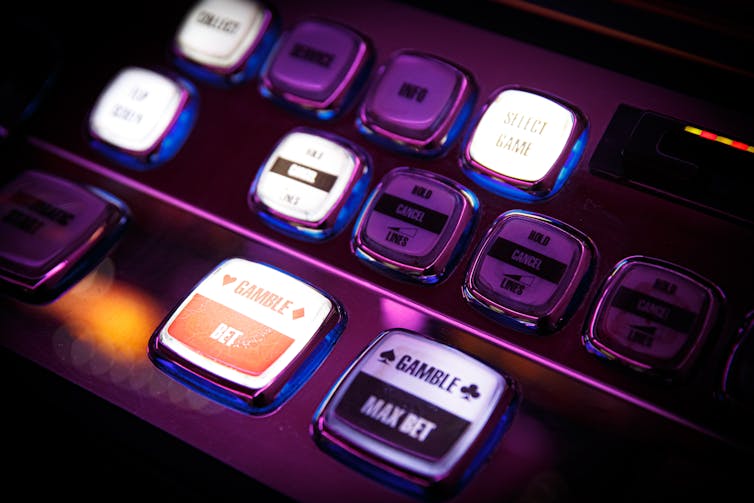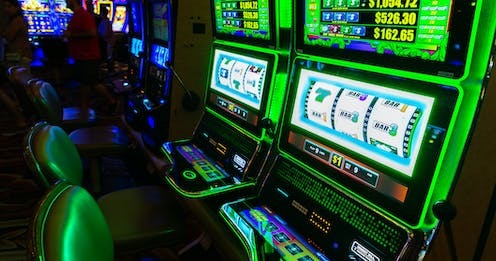Billions of dollars in proceeds of crime are being funnelled through clubs and pubs in New South Wales, according to the NSW Crime Commission. Predictably, the industry is claiming it’s not an issue and solutions are too difficult.
Laundering money through a local club or hotel involves loading cash into one of the state’s 86,640 poker machines, then cashing out and claiming the money as winnings.
This is not a preferred method for most organised criminals, the crime commission says. Sophisticated criminals have other methods. But it is still a sizeable proportion of the estimated $20 billion in criminal proceeds laundered in NSW each year.
In Queensland, you can put only $100 into a poker machine at one time. In Victoria the limit is $1,000. In NSW, newer machines allow $5,000, and older machines up to $10,000. For supposedly harmless suburban fun it’s hard to understand why such sums are allowed.
The findings of the NSW Crime Commission’s inquiry into money laundering via clubs and hotels follow scandalous money-laundering revelations from casino inquiries in NSW, Victoria, Western Australia and Queensland.
Those inquiries found Crown Resorts and Star Entertainment allowed hundreds of millions of dollars to pass through their casinos, in contravention of anti-money-laundering regulations.
Both companies were found not fit to hold their licences. Crown has been fined $80 million in Victoria. Star has been fined $100 million in NSW, and had its licence suspended.
Both have been required to undergo extensive “renewal”. They have agreed to adopt cashless gaming to better protect against money laundering.
It’s therefore unsurprising the NSW Crime Commission’s principal recommendation is to introduce a cashless system for all electronic gaming machines in NSW. Also unsurprising is that the industry is focused on why it shouldn’t.
Cashless gambling recommended
The NSW Crime Commission’s report recommends a cashless gambling system for pubs and clubs the same as for casinos – consistent with the identification requirements of Australia’s Anti-Money Laundering and Counter-Terrorism Financing Act.
Electronic gaming cards would record amounts loaded and withdrawn, times, turnover, and losses/wins. The maximum amount of cash able to be loaded on to a player’s account in a single day would be $1,000.

Older electronic gaming machines in NSW allow ‘load up’ to $9,999. Shutterstock
Josh Landis, the chief executive of ClubsNSW (which represents most of the state’s 1,200 licensed clubs) has said that such technology has not been trialled, and was uncosted and unproven.
But Crown Resorts and Star Entertainment are implementing such systems. Similar systems have been operating successfully in Norway since 2009, and in Sweden since 2013.
Victoria has already implemented a card-based precommitment system, incorporating most necessary characteristics. Every poker machine in the state is linked to this system. Its flaw is it is voluntary, allowing those who wish to clean dirty money, or avoid a limit, to simply opt out.
It’s not just about money laundering
Money laundering isn’t the only reason to introduce cashless gaming systems.
On any day in NSW, hundreds of thousands of people are experiencing significant gambling harm, mostly using poker machines. Many hundreds of thousands more – partners, children, employers – are also harmed as a consequence.
A pre-commitment system incorporating all the features of the NSW Crime Commission’s cashless model would stop money laundering and also help those struggling to control their gambling. For those who want to stop it would provide a truly effective gambling self-exclusion system.
The Tasmanian government has promised to implement a statewide system by 2024.
A matter of political commitment
The real test here isn’t technology. It’s political will.
NSW Premier Dominic Perrottet has expressed concern at the exploitation of vulnerable people via gambling. Opposition leader Chris Minns has said the crime commission’s report is concerning but will not commit to a cashless card.
ClubsNSW and the Australian Hotels Association are two of Australia’s most powerful lobby groups. According to an ABC investigation, they have doled out about a third of $40 million in political donations disclosed by gambling-related organisations over the past two decades.
Since 2010, ClubsNSW has signed memorandums of understanding with incoming governments to protect its members interests.
In the first six months of 2022 (the most recent data available), people in NSW lost $4 billion using pokies – $2.4 billion in clubs, $1.6 billion in pubs. This is 23% more than the same period in 2019, before pandemic restrictions.
Yet according to the Australian Hotels Association, the industry is on “on its knees” and being told to introduce “an unproven, untested, un-costed and unnecessary cashless system”.
In NSW, gambling operators are not permitted to donate to state political campaigns. But ClubsNSW (and its member clubs) can because they are “not for profit”.
If this continues, political parties will be open to the allegation that they, like clubs, are benefiting from the proceeds of crime.
Pokie operators have billions of reasons to assert this is no big deal. Politicians should take a different view.



 Samsung Electronics Shares Jump on HBM4 Mass Production Report
Samsung Electronics Shares Jump on HBM4 Mass Production Report  The pandemic is still disrupting young people’s careers
The pandemic is still disrupting young people’s careers  Debate over H-1B visas shines spotlight on US tech worker shortages
Debate over H-1B visas shines spotlight on US tech worker shortages  AI is driving down the price of knowledge – universities have to rethink what they offer
AI is driving down the price of knowledge – universities have to rethink what they offer  Columbia Student Mahmoud Khalil Fights Arrest as Deportation Case Moves to New Jersey
Columbia Student Mahmoud Khalil Fights Arrest as Deportation Case Moves to New Jersey  What’s the difference between baking powder and baking soda? It’s subtle, but significant
What’s the difference between baking powder and baking soda? It’s subtle, but significant  Toyota’s Surprise CEO Change Signals Strategic Shift Amid Global Auto Turmoil
Toyota’s Surprise CEO Change Signals Strategic Shift Amid Global Auto Turmoil  Disaster or digital spectacle? The dangers of using floods to create social media content
Disaster or digital spectacle? The dangers of using floods to create social media content  Global PC Makers Eye Chinese Memory Chip Suppliers Amid Ongoing Supply Crunch
Global PC Makers Eye Chinese Memory Chip Suppliers Amid Ongoing Supply Crunch  Trump Backs Nexstar–Tegna Merger Amid Shifting U.S. Media Landscape
Trump Backs Nexstar–Tegna Merger Amid Shifting U.S. Media Landscape  TrumpRx Website Launches to Offer Discounted Prescription Drugs for Cash-Paying Americans
TrumpRx Website Launches to Offer Discounted Prescription Drugs for Cash-Paying Americans  Elon Musk’s Empire: SpaceX, Tesla, and xAI Merger Talks Spark Investor Debate
Elon Musk’s Empire: SpaceX, Tesla, and xAI Merger Talks Spark Investor Debate  Uber Ordered to Pay $8.5 Million in Bellwether Sexual Assault Lawsuit
Uber Ordered to Pay $8.5 Million in Bellwether Sexual Assault Lawsuit  Locked up then locked out: how NZ’s bank rules make life for ex-prisoners even harder
Locked up then locked out: how NZ’s bank rules make life for ex-prisoners even harder 
































